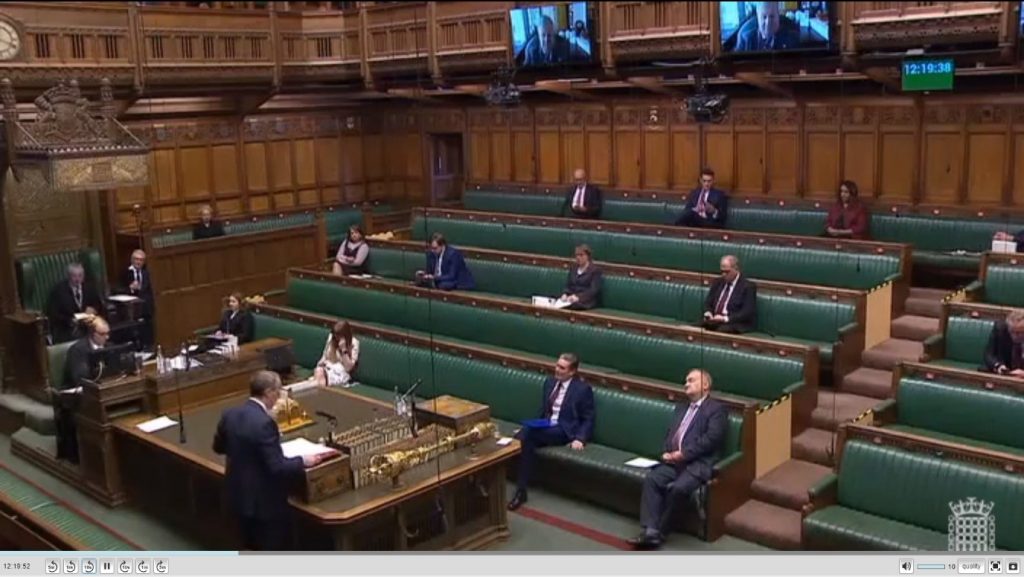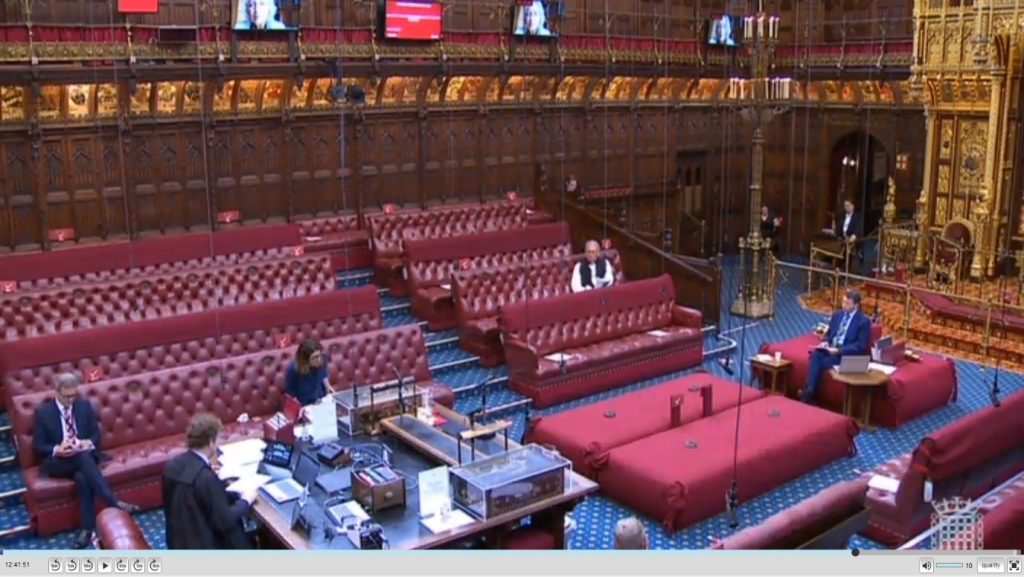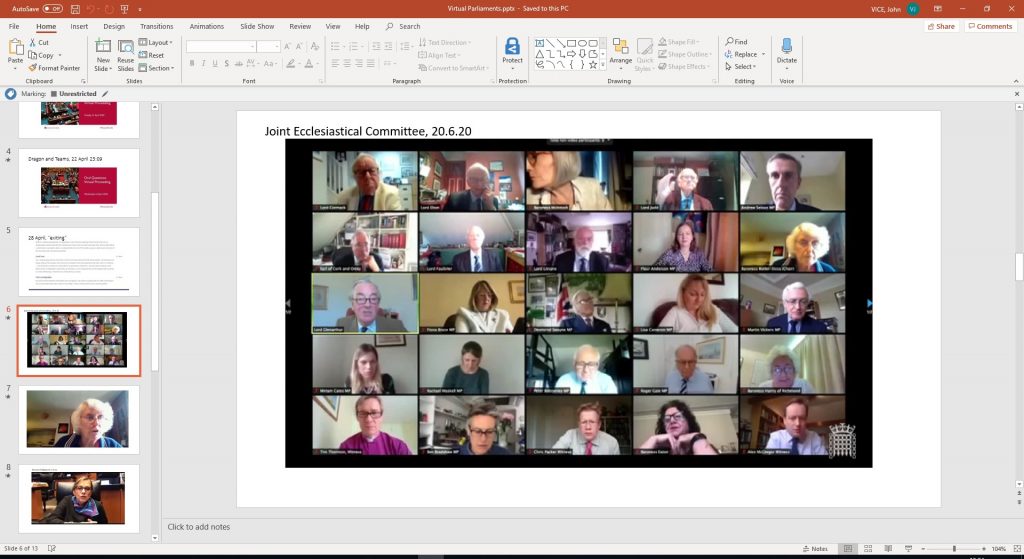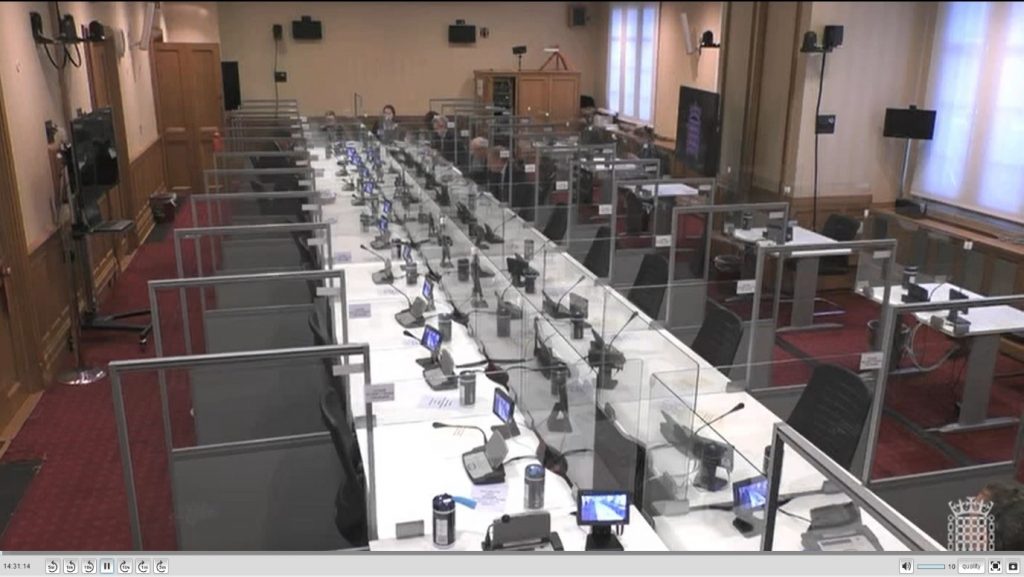I am writing this from a desk in my bedroom while the House of Lords sits as a hybrid debating Chamber some Members physically present, most contributing remotely via Zoom. Over a year into our lockdown reporting measures, as prospects grow for a full or partial return to Westminster, I want to reflect on Hansard’s journey to this point, how the team has coped, and aspects of the experience that we may wish to take into the next phase of our work.
Covid in the UK
On 16 March 2020, 11 days after the first UK death from coronavirus and some six weeks after our first reported case, Prime Minister Boris Johnson advised against non-essential travel and contact with others. Just days later, this advice was replaced by a requirement to stay at home wherever possible for at least three weeks: the first lockdown had begun.
By 5 May, amid soaring infection rates, the UK’s death toll was reported to be the highest in Europe and second highest in the world. After a brief respite over the summer, cases again rose significantly from late August, leading in November to a second lockdown. In response to worsening figures despite this phase of restrictions due in part it seemed to a more transmissable mutation of the virus a third lockdown began on 6 January 2021 just as a mass vaccine rollout was getting under way. The success of the vaccine rollout over the months that followed, combined with the effect of ongoing lockdown measures, created conditions whereby the UK is now following a “roadmap” out of restrictions and towards a hoped-for return to normality.
UK Parliament and Hansard in lockdown
Since March 2020, the UK Parliament has sat in several ways: physically, as normal, until the end of March; alternating virtual and physical sittings in April and May 2020 initially without broadcasts of the virtual sittings and, since then, as a hybrid Chamber. Our brief, however, has remained unchanged: to produce a report to our usual key performance indicators of quality and speed, published online within three hours of a speech being made and in print the following day.
People’s behaviour in Parliament first started to change in early March, as we rather embarrassedly began bumping elbows instead of shaking hands while nervously laughing off the risk of serious impacts on our work and lives. This is the point at which the Hansard team began trialling homeworking, an experiment soon driven faster than we wanted by suddenly worsening infection rates; we were already 100% working from home by the time the first lockdown was imposed.
Like so many others, we made the most of what little time we had to prepare for the biggest changes to our working practices for decades and, in our case, the first time in Hansard’s 100-year history that there hasn’t been a reporter physically present in the Chamber. We created new ways to communicate remotely, although none has so far been able to replicate the easy communication we enjoyed in our open-plan office. Over time, we found ways around the challenge that our reporting software was designed to work on the parliamentary estate but slowed alarmingly when used remotely.
In the early months of lockdown, the Hansard team worked significantly more slowly from home we anecdotally estimate that output rates were between 60% and 80% of those achieved in our office. The main delays were slower software, poor internet connections and slower communication. Much more worryingly, several members of the team fell ill with coronavirus thankfully, all have recovered fully and we have all grappled to varying degrees, according to our different circumstances, with the challenges of isolation.
In the autumn of 2020, between the second and third lockdowns, those members of the team who wanted to work in the office were briefly able to return. Since April 2021, with the lifting of the third lockdown, we have operated the same approach: working from home is our default but colleagues can work in the office if they prefer to do so.
Virtual sittings
Although Hansard staff had begun working from home in March, the House of Lords continued to meet physically until Easter 2020 with all debates broadcast and available to us online. The Easter break gave us time to prepare for the next big change: the Lords would hold as many debates as possible entirely virtually while the House of Commons would sit in a hybrid manner, some Members physically in the Chamber and others contributing remotely via Zoom over large television screens.
To allow the small broadcasting team to prepare for the Commons hybrid sittings, the House of Lords was given the simplest technical solution: meetings would be conducted online via Teams software, there would be no external broadcast and the only record of the debate would be the official Hansard report. Then, when the broadcasting team had got the Commons working, they would bring cameras back to the Lords.

It fell to me to work out how to make digital audio recordings using Teams. This was not my specialist area I’d last made recordings as a teenager, from the radio with a cassette recorder! The main recording of the first virtual sitting failed, so the published broadcast was a back-up I had made testing Audacity recording software (you can hear a phone call coming through to me at 3:20 in this clip!). We also found that the Dragon voice recognition software broke through all the microphone security controls in Teams (listen to this clip from 23:09 to hear our Dragon reporter contributing to the debate – very embarrassing).
The worst problem emerged the following week when an automated voice in Teams announced the mobile phone numbers of Peers as they joined or left the meeting – a serious data security breach. That’s why there is no audio recording for 28 April. We had to take it down.
Hybrid sittings
To our great relief, the broadcasting of debates resumed on 5 May 2020 with meetings now using Zoom software and the Lords sitting for the first time as a hybrid Chamber. A few Members were present in the House while most spoke remotely, appearing on large screens around the Chamber. The broadcasting team had skills and levels of resilience that we lacked in Hansard and all debates were published online. The House of Lords has used this model ever since.

Committees began meeting entirely remotely in the early summer of 2020. The main Lords committee, Grand Committee, resumed in September, with some Members present in a Covid-secure room and most contributing remotely. From this point on, with a large backlog of meetings and business to deal with, our workload increased significantly.


One year on
As we have moved during the last year of adaptations from short-term emergency mode to a longer-term footing, different problems have emerged for the Hansard team. Our workflow is vulnerable to technical and human challenges. It sometimes feels like a house of cards, and many passing breezes make it sway worryingly. The team have very different working environments in their homes – some good, some bad – and RSI (repetitive strain injury) problems are emerging. Most significantly, I am aware that we all need to look after our mental health and well-being, and that this needs to be managed carefully and sensitively. It is very hard to tell how someone is on a video call – as a therapist friend of mine said, “You can’t smell how people are on a video call.”
With the vaccine rollout continuing apace, the likelihood increases of the Lords sitting entirely physically again and all the Hansard team returning to the office. However, it is quite possible that Members of the Lords will find benefits in continuing with hybrid sittings once the pandemic is over. By the same token, we now know that, for all the challenges involved, Hansard can be published when we work from home, and some of us may want to continue to do so. Flexibility may bring benefits to our working lives and potentially to our business model. However, we are yet to discover how and indeed how well a hybrid model of reporting will work with the team split between home and office. At the same time, for as long as social distancing rules remain, the larger the numbers returning to the office, the greater our accommodation challenges may be.
Whatever the scale and timing of our return to a physical presence in the Palace of Westminster, we will continue to benefit from the improvements made during lockdown to our intranet, communications software and other systems. These have been challenging and stressful times, but I am proud of what the Lords Hansard team have achieved and that we have not (yet) missed a publication deadline. We are getting through the crisis together and look forward to building on what we have learned.
John Vice has been Editor of House of Lords Hansard since 2012 and has worked in the UK Parliament as a parliamentary reporter for more than 30 years. He is president of the Commonwealth Hansard Editors Association and the Deputy Editor of Tiro.
-
[…] House of Lords Hansard: our lockdown journey […]
Leave a Reply to Georgette Sante Cancel reply





Thank you for sharing your professional experience John